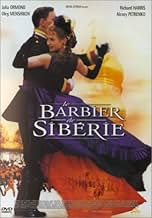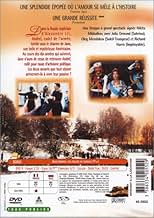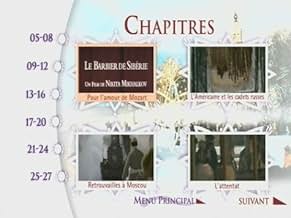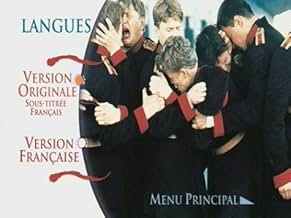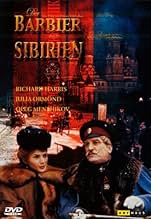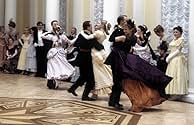IMDb RATING
7.6/10
13K
YOUR RATING
At the turn of the century, a young Russian cadet falls in love with an American beauty, endangering his career and even their lives.At the turn of the century, a young Russian cadet falls in love with an American beauty, endangering his career and even their lives.At the turn of the century, a young Russian cadet falls in love with an American beauty, endangering his career and even their lives.
- Awards
- 1 win & 4 nominations total
Julia Ormond
- Dzheyn
- (as Dzhuliya Ormond)
Richard Harris
- McCracken
- (as Richard Kharris)
Daniel Olbrychski
- Kopnovskiy
- (as Daniel Olbrykhskiy)
Robert Hardy
- Forsten
- (as Robert Khardi)
Elizabeth Spriggs
- Perepelkina
- (as Elizabet Spriggs)
Isabelle Renauld
- Empress
- (as Ezabel Reno)
Featured reviews
This is not Mikhalkov's best film. Yet a Mikhalkov film is one that presents a story with a twinkle in the eye. His films come very near to the black comedy genre. Take his swipe at the average American not understanding Mozart's music--if it is taken literally, it will cloud the Mikhalkov perspective of life through cinema. That perspective is poles apart from the filmmaking of his half brother Andrei Mikhalkov Konchalovsky, who is serious and quite a bit of a perfectionist (he worked with Andrei Tarkovsky on his earlier movies), e.g. "Runaway Train" and "Shy People" made in Hollywood or "Siberiade" made in the former USSR.
Mikhalkov makes serious scenes seem light and a lark: the deportation to Siberia marked with opera singing; the dangerous duel that ends with a hero lying wounded in a Quixotic manner; a very tall Czar Alexander (the director) who puts down his queen with a most 'unroyal' remark. Mikhalkov and his half brother are great visualizers and have good ears for music--which is why the film is a treat to watch--natural splendors of Siberia, recreating a "Dr Zhivago" milieu with more authenticity than Mr Lean (who did a great job considering he could not shoot his film in the USSR).
I am a great admirer of good Russian cinema: especially the works of Tarkovsky, Kozintsev, Eisenstein, Konchalovsky, Talankin in that order. Mikhalkov is not the best but all his films are worth a view. But I have one suggestion--never take his films as what appears for there is a layer underneath the obvious--that needs to be seen tongue in cheek. And unlike Konchalovsky--the quality of direction is never consistent in Mikhalkov's works--it varies from the brilliant to the almost stupid.
But Mr Mikhalkov, what a pathetic waste of Richard Harris' talent to merely advertise his name in the credits for an insignificant role in a long movie...
Mikhalkov makes serious scenes seem light and a lark: the deportation to Siberia marked with opera singing; the dangerous duel that ends with a hero lying wounded in a Quixotic manner; a very tall Czar Alexander (the director) who puts down his queen with a most 'unroyal' remark. Mikhalkov and his half brother are great visualizers and have good ears for music--which is why the film is a treat to watch--natural splendors of Siberia, recreating a "Dr Zhivago" milieu with more authenticity than Mr Lean (who did a great job considering he could not shoot his film in the USSR).
I am a great admirer of good Russian cinema: especially the works of Tarkovsky, Kozintsev, Eisenstein, Konchalovsky, Talankin in that order. Mikhalkov is not the best but all his films are worth a view. But I have one suggestion--never take his films as what appears for there is a layer underneath the obvious--that needs to be seen tongue in cheek. And unlike Konchalovsky--the quality of direction is never consistent in Mikhalkov's works--it varies from the brilliant to the almost stupid.
But Mr Mikhalkov, what a pathetic waste of Richard Harris' talent to merely advertise his name in the credits for an insignificant role in a long movie...
Do you know why "The Barber of Siberia" has not been released in the USA? After watching the film, the committee, which approves the foreign films for being released at the American movie theatres, said: "It's impossible for an American sergeant not to know who was Mozart! The film reveals the American officers as morons, so it is not suitable the film to be shown at the theatres". That's the explanation, which Nikita Mikhalkov gave by himself for the lack of releasing of "The Barber of Siberia" in the USA during his guesting of a popular Bulgarian talk-show. That reminds me of a line from the RAMMSTEIN's famous song called "Amerika": "Die Freiheit spielt auf allen Geigen..." In English:"The Freedom is playing at all violins..." (the song aims to show the "freedom" and the "non-censorship" in the USA) By the way the broadcasting of that song at any American television is forbidden.
beautiful landscapes. and seductive story. clever mixture of humor and drama. a bitter love story. and Russia in a splendid portrait about past, tradition, image about world, love and duty. Oleg Menshikov does one of that characters who are essence of a state of soul. the science to explore the emotions of young Tolstoy, the madness of gesture from profound love, the dialog with Jane, the search of sense in an absurd universe, all as embroidery of significant details. Julia Ormond gives a special aura to her character. and that is not a real surprise. the film is about evolution. the evolution of lead characters. the evolution of Russia itself. an admirable scene - the presence of Nikita Mikhalkov as Alexander II . a not great film. but, surely, a beautiful one.
10Gergy
I went to see this movie based on a suggestion from a good friend of mine. I expected to see a typical love story and was curious about the way this story was developed and directed. I admit that my expectations were very low in this regard. The Barber of Siberia is a work of art, Mikhalkov is surely one of the great movie authors of all times, and I am humbly thankful to my friend for her priceless advice.
The plot may seem like any conventional love story but the fashion in which the story is developed and the performances of all the actors (yes, ALL of them) is really fascinating.
What strikes you most is when Mikhalkov directly compares the life of a military cadet between Russia and the US. There's also a latent comparison between the American and Russian ideals. I leave it to you to discover how and when these comparisons appear on screen.
Mikhalkov magnificently plays the role of the Tzar Alexander III (the father of the recently canonized Tzar Nicholas II). As portrayed by Mikhalkov, Alexander III embodies the grandeur of Russia and sets the standard on the qualities of a ruler. You cannot but compare these standards to those set by Boris Yeltsin (who was in charge in 1998) and you would better understand the passing of power to Putin.
This is one of the rare times I get emotional about a film, and believe me the Barber of Siberia contains a lot of emotions. DON'T MISS IT AT ANY RATE!
The plot may seem like any conventional love story but the fashion in which the story is developed and the performances of all the actors (yes, ALL of them) is really fascinating.
What strikes you most is when Mikhalkov directly compares the life of a military cadet between Russia and the US. There's also a latent comparison between the American and Russian ideals. I leave it to you to discover how and when these comparisons appear on screen.
Mikhalkov magnificently plays the role of the Tzar Alexander III (the father of the recently canonized Tzar Nicholas II). As portrayed by Mikhalkov, Alexander III embodies the grandeur of Russia and sets the standard on the qualities of a ruler. You cannot but compare these standards to those set by Boris Yeltsin (who was in charge in 1998) and you would better understand the passing of power to Putin.
This is one of the rare times I get emotional about a film, and believe me the Barber of Siberia contains a lot of emotions. DON'T MISS IT AT ANY RATE!
I must have an extremely bad taste. Most professional critics have written devastating comments on this movie. I just loved it, all 180 minutes of it! Of course, according to the rules, you should not mix slapstick and serious drama. Mikhalkov does it and the result completely vindicates him, I feel. Critics should not forget that cinema is about entertainment. They blame Mikhalkov because he did not make another high brow artistic movie like « Burnt by the sun ». I liked both movies equally well, different as they are. Critics say Mikhalkov presented a phony image of old Russia. Of course, his billboard image of tsarist Russia is not devoid of clichés and camp, but what a glorious camp it is! Mikhalkov is accused of painting a much too rosy picture of old Russia. But are the Russians (and other people) not entitled to some glimpses of the beautiful Russia that could have been, but somehow never seems able to materialize in this century of gloom ? The critics point out that the movie has a lot of formal weaknesses. To the heck with the critics ! This movie may not have a very deep message, but I think it illustrates, in a poetic way, the difficulty Russians and Westerners have at understanding each other. Either you love this movie, or you d better leave it . When you look at the viewer voting results, you see that three quarters of those who voted on this movie adore it (scores 8-10), while the others loathe it (scores 1-4). Apparently it is a movie you can't be indifferent about.
Did you know
- TriviaThe winter in 1997 was uncommonly snowless and warm, but the movie makers wanted to film snowy Moscow streets and the Kremlin. So they used hundreds of tons of artificial snow.
- GoofsIn a scene which takes place in 1905, a US flag is seen with 50 stars. The correct flag would have 45 Stars.
- ConnectionsFeatured in Namedni 1961-2003: Nasha Era: Namedni 1999 (1999)
- SoundtracksPiano Concerto no. 23
Composed by Wolfgang Amadeus Mozart
- How long is The Barber of Siberia?Powered by Alexa
Details
Box office
- Budget
- $35,000,000 (estimated)
- Gross worldwide
- $2,634,218
- Runtime3 hours
- Color
- Sound mix
- Aspect ratio
- 2.39 : 1
Contribute to this page
Suggest an edit or add missing content


